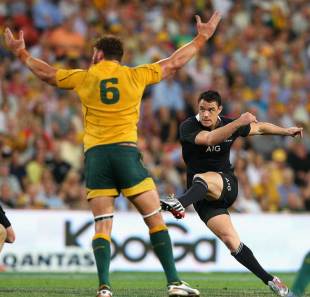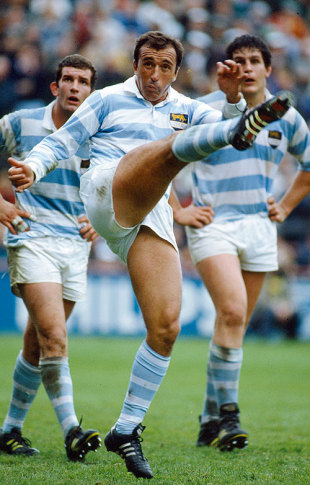|
Ask John
Extra time and Knotze
John Griffiths
October 24, 2012

The All Blacks' draw with Australia on Saturday ended their run of 105 Tests in a row where they scored a try
© Getty Images
Enlarge
Welcome to the latest edition of Ask John where renowned rugby historian John Griffiths will answer any rugby-related query you have! So, if there's something you've always wanted to know about the game we love but didn't know who to ask, or you think you can stump our expert - then get involved by sending us a question. In this edition, John looks at the All Blacks' try-run, Heineken Cup queries, combined teams and Martin Knotze. I've been trying to work out since watching the 18-18 draw between the All Blacks and Australia on Saturday when was the last time the All Blacks were involved in a match where a try wasn't scored? Further to this, when last did the All Blacks NOT score a try and NOT lose the match? Steven John, Wales Saturday's try-less Bledisloe Cup draw not only ended New Zealand's tilt at the world record for successive Test wins, it brought to an end their impressive run of 105 Tests in a row in which they had scored at least one try. The last time they failed to cross the goal-line was against Australia in Sydney in a 23-18 defeat in the 2004 Tri-Nations. Each side kicked six penalty goals that day, Lote Tuqiri's try for the Wallabies proving the difference between the nations. Since losing the 1999 World Cup Bronze Final (without scoring a try) against South Africa, the All Blacks have played 158 Tests in the new millennium. On only four occasions have they failed to score a try. Their 12-3 win against South Africa in their Tri-Nations opener in Cape Town in July 2001 was by four penalties to one and their 12-6 win against Australia in their Tri-Nations opener in Christchurch in 2002 was by four penalties to two - the last time they were involved in a Test where a try wasn't scored AND the last time they were try-less without losing. Their other two try-less Tests were the 2004 and 2012 Tests with Australia noted above. Richie McCaw, incidentally, has only been involved in two of New Zealand's try-less Tests: against Australia in 2002 and last weekend's Test in Brisbane. He made his debut in the autumn of 2001 and missed the 2004 Tri-Nations game with Australia. How many Heineken Cup Finals have needed extra time to be settled and which were they? Hedley Line, Brazil Two Finals went to extra time. The first Heineken showdown was between Cardiff and Toulouse in January 1996 at the Arms Park where the visitors established an early 12-0 lead through tries by Thomas Castaignède and Jérôme Cazalbou, one of which Christian Deylaud converted. Adrian Davies brought Cardiff back into the game and tied the scores at 15-all with the last kick of ordinary time. Davies and Deylaud then exchanged penalties in extra time before the Frenchman landed the winning penalty in the last minute. Toulouse thus became inaugural holders of the Heineken Cup, winning 21-18. Toulouse benefited from extra time in the only other extended Final, at Murrayfield in 2005. The game was locked at 12-12 after normal time before Toulouse added two more goal kicks to a try-less game to beat Stade Français 18-12. (Toulouse had been denied extra-time the year before when Rob Howley scored in the 80th minute to give Wasps a 27-20 win in the Final at Twickenham). Extra time has been rarely used in the knockout rounds. Toulouse and Brive featured in a 16-all semi-final at Toulouse in December 1997 before contesting extra time. Christophe Lamaison (for Brive) and Yann Delaogue (Toulouse) added two penalties each to make it 22-all after another 30 minutes, Lamaison levelling the scores in the 110th minute whereupon Brive were declared winners on superior try count (2-1). They went on to lose their 1998 Final with Bath, 19-18. The most famous extended game was at the Millennium Stadium in May 2009 when Cardiff lost to Leicester. The sides played 80 minutes of normal time and then extra time to finish all square at 26-26, each side having scored two tries. A penalty shoot-out then kicked in and the Tigers won 7-6, Martyn Williams missing before Jordan Crane succeeded for Leicester. Toulouse required extra-time to beat Biarritz 27-20 in the 2011 quarter-finals. How many teams have been ever-presents in the Heineken Cup competitions? Michael O'Neill, Ireland This is the 18th season that Europe's premier sub-international tournament has taken place. English and Scottish clubs (and Llanelli) were not involved in the inaugural Heineken Cup in 1995-96, while Cardiff and Swansea joined the English clubs in boycotting the 1998-99 tournament. Only four sides have competed in all 18 tournaments: Toulouse and the three major Irish provinces, Ulster, Munster and Leinster. These four have carried off ten of the 17 previous titles. Wasps (in 2004 and 2007) are the only side outside these four to win the Heineken Cup since 2002. I can't seem to find the team lists for the South American Jaguars Tests against the Springboks from 1980 to 1984. In particular I'm interested in whether any of the starting XV or replacements used were from any country other than Argentina, especially for the Test they won in Bloemfontein in 1982. Grant Parker, Australia There were eight Tests played by South Africa against South American or South American/Spanish combinations between 1980 and 1984. South Africa won seven of them and their opponents one (21-12 in the Bloemfontein Test you refer to in 1982).

Argentinian great Hugo Porta led the South American party to South Africa in April 1980
© Getty Images
Enlarge
Hugo Porta led a party of 26 players on a seven-match visit to South Africa in April/May of 1980. Only four of the party - one each from Paraguay, Brazil, Chile and Uruguay - were not Argentinians. All of the tourists who featured in the two-Test series were from Argentina. In October of the same year the Springboks made a reciprocal tour of South America, playing six matches in Paraguay, Uruguay and Chile including two Tests in Santiago. South Africa won the series 2-0 and once again all of the South American sides and replacements used in the internationals were from Argentina. When the second South American visit to South Africa took place in March/April 1982 the tour party was 42-strong, the 14-match itinerary demanding that the visitors field two fifteens simultaneously. Although there were five Chileans, five Uruguayans and two Paraguayans in the playing party, none appeared in the shared two-Test series. The final inter-change was in 1984 when a South American/Spanish party of 29 players made a seven-match visit late in the season. This time there was one each from Chile, Peru, Uruguay and Paraguay together with two from Spain in the playing group. Both Tests were won by South Africa and for the final international, won 22-13 by South Africa in Cape Town, John Bird (Uruguay) and Tomás Pardo Vidal (Spain) featured in the visitors' starting pack - the only non-Argentinian players to play in any of these Tests. Hugo Porta led the combined side in all eight of the 1980-84 Tests. Full details of the matches can be found on this website. I recently saw two "classic match" broadcasts of the NZ v World XV series in 1992. I have two questions: Who is/was Martin Knotze (who played in the first Test and replaced Jeremy Guscott in the second), and for whom did Gavin Hastings come on as sub in the second Test? Matthew Wallis, United States This three-Test series against a composite World XV was staged to mark the NZRU's centenary celebrations. There were thirty players invited to join the World XV under the management of Brian Lochore. They were coached by Ian McGeechan with Australia's Bob Templeton as his assistant. Scotland's David Sole led the World XV to a 28-14 victory in the opening Test in Christchurch where Martin Johannes Knoetze played on the wing and scored one of the invitation side's three tries. At the time he was a Transvaal and Junior Springboks full-back/centre/fly-half who had made his provincial debut in 1984. He never won Springbok colours and was the only man in the first Test who never won a cap for his country. Jannie Claassens, the only other player in the World party who never won a cap, played centre alongside Jeremy Guscott in the second Test which New Zealand won 54-26 in Wellington. Claassens, however, was a Springbok. In 1994, he played eight matches (but no Tests) on tours to New Zealand and, later in the year, to Scotland, Wales and Ireland. Knoetze replaced Guscott at half-time while Gavin Hastings came on for full-back André Joubert fifteen minutes from the end. The other replacements used in the World XV were Australia's Troy Coker (on the hour) for his compatriot John Eales and Phil Kearns as an emergency flanker nine minutes from time for Brendan Nasser. The All Blacks took the series by winning the third Test 26-15 in Auckland, Claassens and Knoetze starting in the World XV three-quarter line that day. © ESPN Sports Media Ltd.
|
Live Sports
Communication error please reload the page.
-
Football
-
Cricket
-
Rugby
-
- Days
- Hrs
- Mins
- Secs
F1 - Abu Dhabi GP
Abu Dhabi Grand Prix December 11-131. Max Verstappen ()
2. Valtteri Bottas (Mercedes)
3. Lewis Hamilton (Mercedes)
4. Alexander Albon ()
5. Lando Norris ()
6. Carlos Sainz Jr ()
-
ESPNOtherLive >>
Snooker - China Open
Tennis - Miami Open

